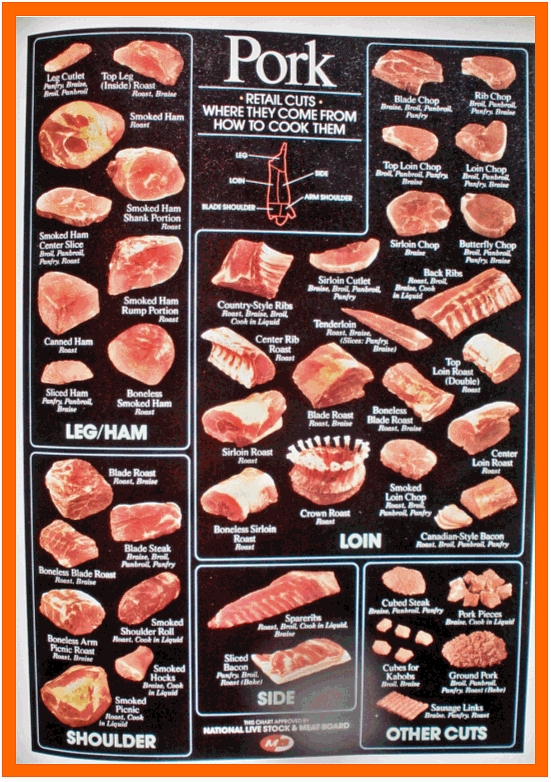PORK:
Cuts
First, let’s learn some basics about cuts and where they come from. Note that the asterisks show the most popular cuts.
Let’s Start with the Most Tender
Ham
This section, from the back leg, provides cuts that are sold fresh or cured, and are best when prepared with dry cooking methods. Look for bone-in cuts for the most flavor, and boneless for easier cutting.
- Fresh Ham (Whole)
- Fresh Ham Shank Half*
- Fresh Ham Rump Half
- Fresh Ham Steak (Boneless)
- Fresh Ham Steak (Bone-in)*
Loin
The loin is very versatile and yields the most common cuts of pork, like pork chops or the tenderloin. Try dry cooking methods when preparing these for robust flavor.
- Rib End Roast (Boneless or Bone In)
- Quarter Loin Chops*
- Center Cut Rib Chops (Bone-In)*
- Rib End Chops
- Boneless Sirloin Chops*
- Boneless Pork Cubed Steak
- Pork Baby Back Ribs
- Boneless Pork Loin Roast Tied*
- Country Style Spareribs (Boneless or Bone-In)*
- Loin End Roast (Boneless or Bone In)
- Center Cut Loin Roast (Boneless)*
- Center Cut Loin Roast (Bone-In)
- Center Cut Loin Chops (Boneless or Bone In)
- Loin End Chops
- Pork Tenderloin (Whole)*
- Crown Roast
- Boneless Pork Loin Roast Tied
Now for the Less Tender, but Still Delicious
Spareribs
This section is from the ribs closer to the breastbone, and offer cuts best grilled or braised for a long time at a low temperature.
- Fresh Pork Spareribs*
Shoulder
The shank cuts are best prepared with moist cooking methods, like braising or in stews and stock.
- Shoulder Butt Steak
- Shoulder Butt Roast
- Fresh Bone-In Picnic (Whole)*
- Fresh Boneless Rolled Picnic
- Southern Style Spareribs (Boneless or Bone-In)*
Cooking Methods
Each cooking method brings out a different taste and texture in your cuts of pork, so take a moment to learn more about which method goes best with which cut.
Tender Cuts
For tender cuts, cook at a higher temperature for a shorter amount of time and use dry techniques such as:
- Broiling
- Grilling
- Roasting
- Pan-Frying
- Less Tender Cuts
The less tender portions of the hog can be tougher, so cook these cuts at a slower pace and at lower temperatures, with moist heat cooking methods such as:
- Braising (cooking in a small amount of liquid over a long period of time)

